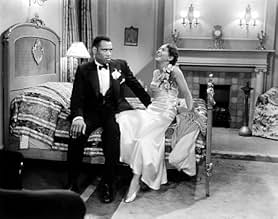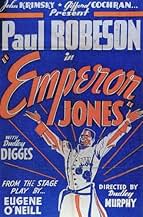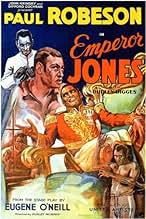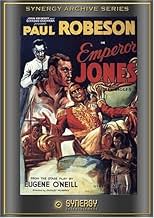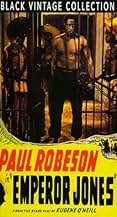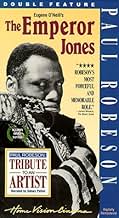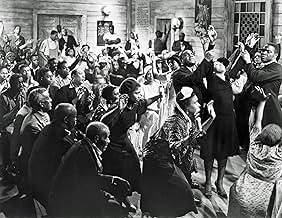Unscrupulously ambitious Brutus Jones escapes from jail after killing a guard and through bluff and bravado finds himself the emperor of a Caribbean island.Unscrupulously ambitious Brutus Jones escapes from jail after killing a guard and through bluff and bravado finds himself the emperor of a Caribbean island.Unscrupulously ambitious Brutus Jones escapes from jail after killing a guard and through bluff and bravado finds himself the emperor of a Caribbean island.
- Awards
- 2 wins total
- Jeff
- (as Frank Wilson)
- Lem
- (as George Stamper)
- Carrington
- (uncredited)
- Stick-man
- (uncredited)
- Extra in Nightclub Scene
- (uncredited)
- Court Crier
- (uncredited)
- Pianist
- (uncredited)
- Marcella
- (uncredited)
- Young Tap Dancer
- (uncredited)
- Treasurer
- (uncredited)
- Extra in Nightclub Scene
- (uncredited)
- Extra in Nightclub Scene
- (uncredited)
Featured reviews
Apparently, when this film came out it was controversial in black communities because of the use of the n-word, and even Paul Robeson went on to say he "regretted" the picture. Strange that today (2016) we celebrate the film as a great achievement.
Indeed, regardless of any racism or stereotypes, we have to marvel at the achievement of making a film with strong black characters in 1933. Has any other film even come close to this around the same time? I don't think so. Black actors were still largely used for comic relief up through the 1940s!
Brutus Jones is a tremendous step forward in American dramaturgy because he is the central figure. Than said O'Neill's play still maintains stereotyping. Brutus is a porter on a train, who frequently plays craps, and who has an argument with his friend Jeff and kills him in a fight with razors. He flees to a foreign island, and he soon discovers that he has leadership qualities there that enable him to set up a monarchy there with himself as Emperor. He even sets up a court with uniformed courtiers. But the moment he gives orders to destroy a village for not showing proper deference to him, his reign begins to fall apart. And soon from being Emperor he becomes a hunted animal.
The stereotyping continues, with Brutus slowly losing his bearings and balance due to the incessant drums beating in the forest surrounding him. He hallucinates and sees the ghost of Jeff. He has always spread the word of his invincibility by saying only silver bullets could kill him. So his pursuers melt silver down to make the bullets they use to hunt him down and kill him.
As was pointed out on another discussion of the film on this thread, O'Neill based the fall of Jones on that of Haitian Emperor Henri I (Henri Christophe), except that he committed suicide with a silver bullet when he was about to be captured and executed.
The play was successful, and would be one of the first triumphs in Paul Robeson's career. He did not originate the role (as he did not originate the role of Joe in the stage production of SHOWBOAT). But he became identified with the role - to the point that he made this independent, somewhat defective production of the film in 1933. Except for Dudley Digges, as the one white man in Jones' kingdom (and Jones' occasional intimate), the cast is pretty forgettable. But it is watching Robeson in his one major lead role that holds our attention. He is a commanding figure in the film and fits the role of a man who loses his throne and power and sanity and life in one evil night. Still, one really wishes that the film's production values could have been better - some of the special effects (the appearance of the ghost of Jeff for example) are quite weak.
With it's defects it is a measure of watching Robeson at his best that I'd rate it a "7" out of "10".
Once we arrive on the island, however, and are confronted by Dudley Digges as a stage Cockney and other theatrical contrivances, the narrative's admirably headlong pace not only slows down considerably, but the movie itself starts to fall apartalthough we still have some great moments as the vain Jones takes over the kingship and attempts to bleed the natives white.
The original play has the white merchant character Smithers played here by Dudley Digges as the eyes of author O'Neill who narrates the first scene in flashback. Here we have a straight narrative with a backstory added. If you think that the backstory looks something like Porgy And Bess that's because the screenplay was written by Dubose Hayward the original author of that work before the Gershwin brothers set it to music.
Back in those days being a Pullman porter was a status symbol among black people, the first labor union organized that gained decent wages and collective bargaining rights for black people was the Brotherhood of Sleeping Car Porters. When Brutus Jones kills his friend in that crap game in a fight over a woman, he's not just a fugitive, he's lost a lot of standing among his peers. But in fleeing to that Caribbean island where the natives are descended from escaped slaves who still retained some animist beliefs from Africa, he's got it all over this crowd and reasserts himself with nerve, knowledge, and a little trickery and a bit of help from Dudley Digges's character.
Although he did not originate the role, Paul Robeson debuted with it on the London stage and the actor who Eugene O'Neill handpicked to originate the part, one Charles Gilpin faded into obscurity. Of course there's also no singing in O'Neill's Emperor Jones, but Robeson's bass/baritone gets a few good songs in as well, from hymns, to Negro spirituals, to some convict laments. Robeson was always a powerful performer no matter what you think of his politics.
This version of The Emperor Jones has as much Hayward as O'Neill, still what O'Neill was trying to convey comes out in a glorious triumphal performance by Paul Robeson.
Eugene O'Neill's allegorical fable comes alive in this unique and intriguing film, recently restored by the Library of Congress. The legendary Paul Robeson dominates the film as a man who abandons his wife & Baptist upbringing to worship himself, wallowing gleefully in sin & violence as long as it furthers his goal for power & riches - the chance to become an emperor of his own tiny domain is merely the latest opportunity in a serendipitous sequence to be exploited.
Robeson's athletic physique, magnificent singing voice, accomplished acting skills and over-sized personality make him the ideal choice for the complex role. Whether leading chained prisoners in song, using brains & bravado to seize his little kingdom, or slyly peering at himself in a succession of mirrors as he enters his throne room in full military regalia, Robeson is never less than fully entertaining.
Fredi Washington shines in her small role as Robeson's faithful wife. Dudley Digges is appropriately unsavory as the white trader with whom Robeson must do business in order to keep his throne.
Movie mavens will recognize a young Moms Mabley as the owner of a New York City nightclub; an even younger Harold Nicholas (of the Nicholas Brothers) as a boy tap dancer & the wonderful Rex Ingram as Robeson's Court Crier - all uncredited.
This film should be considered as a product of its times; it makes no pretensions towards political correctness.
***********************
O'Neill's play is obviously based on the historical Henri Christophe (1767-1820), the former slave who, after being involved in the bloody revolution against the French and the assassination of his predecessor, became president of northern Haiti in 1807 and its self-proclaimed king in 1811. Despotic & brilliant, King Henri enjoyed a reign of enormous brutality and opulence. He built for himself 6 châteaux, 8 palaces and the massive Citadelle Laferrière, still considered one of the wonders of the age. Christophe supported himself with a fabricated nobility consisting of 4 princes, 8 dukes, 22 counts, 37 barons & 14 knights. After a paralytic stroke left him disabled, the people rose in revolt and Christophes followers fled. Naturally reluctant to face the wrath of his former subjects, Christophe shot himself with a silver bullet.
Did you know
- TriviaFredi Washington had to reshoot her scenes wearing dark make-up when the Hays Office deemed her as appearing too light-skinned in the first rushes. They feared audiences would think Paul Robeson was embracing a white actress.
- GoofsWhen Jones lands on a Caribbean island, there are prickly pear and San Pedro cacti on the beach, neither of which are found in the Caribbean.
- Quotes
Brutus Jones: I's got five lead bullets in this gun good enough for common bush niggers. And after that, I's got this silver bullet left to cheat 'em outta gettin' me. I tells 'em, when the time comes, I kills myself with it. That's 'cause I'm the only man in the world big enough to get me.
- Alternate versionsThe 72-minute version has different opening credits. In the original version, the title reads "The Emperor Jones" in uppercase (capital) letters. In later prints of this film, including the 72-minute version nearly always screened on TV, the title reads merely "Emperor Jones" , in lowercase letters.
- ConnectionsEdited into SanKofa Theater: The Emperor Jones (2022)
- How long is The Emperor Jones?Powered by Alexa
Details
- Release date
- Country of origin
- Language
- Also known as
- El emperador Jones
- Filming locations
- Eastern Service Studios, Astoria, Queens, New York City, New York, USA(Kaufman Astoria Studios since 1982)
- Production company
- See more company credits at IMDbPro
Box office
- Budget
- $263,000 (estimated)
- Runtime
- 1h 12m(72 min)
- Aspect ratio
- 1.37 : 1

